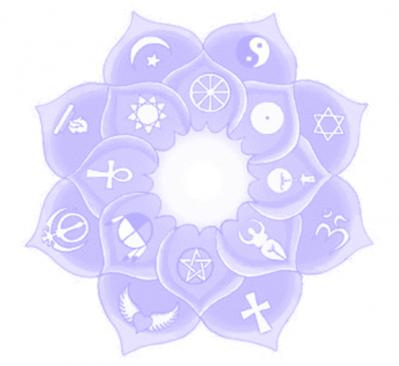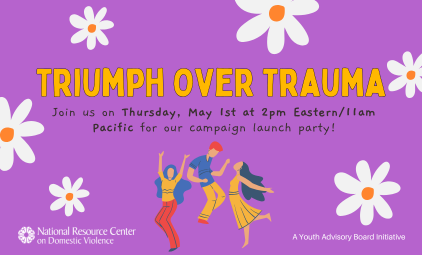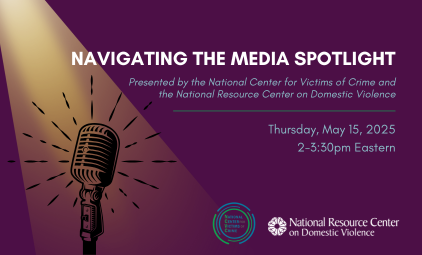by Patty Branco, NRCDV Senior Technical Assistance and Resource Specialist
Many survivors of domestic and sexual violence experience religion, faith, and/or spirituality as distinctive elements of their identity and personal lives. Advocates are working with survivors who, regardless of faith or religious affiliation, may wish to mobilize resources rooted in their belief systems in their journey towards safety, solace, and support. Some survivors will “find strength to cope with, heal from, break free from, and/or remain free from abusive relationships through their spirituality and/or engagement in religious community” (Institute on Domestic Violence in The African American Community, 2009). That being said, survivors should not be expected to choose between safety and their religious community or tradition; they should be able to access the resources of both secular advocacy programs and their faith-based communities. Secular programs that are responsive and sensitive to the spiritual and religious needs of survivors can help them identify options and resources that are relevant and specific to their particular needs and goals.
"No woman should ever be forced to choose between safety and her religious community or tradition. She should be able to access the resources of both community-based advocacy and shelter and faith-based support and counsel. For her to do so, she needs these two resources to work collaboratively so that they can provide consistent advocacy and support for victims and survivors and participate in the process of holding perpetrators accountable" (Fortune & Enger, 2005).
Recommendations for secular anti-violence advocates
To adequately respond to the multiple needs of domestic and sexual violence survivors, it is critical that advocates understand the importance of faith and spirituality as source of healing and strength for many of those they serve. Partnerships and collaboration between secular programs and faith-based communities will enable the development of more comprehensive and supportive responses to survivors. The following are recommendations for domestic violence and sexual assault victim advocates for more effectively responding to the broad needs of survivors, including incorporating spiritual elements into their programs.
- Remain survivor-centered. As advocates have learned from the concept of survivor-centered advocacy, work on behalf of survivors of domestic and sexual violence must be built on the premise that survivors have the right and ability to make personal choices and decisions. Advocacy, in this sense, starts from the survivor’s perspective, integrates the advocate’s knowledge and resources, and ultimately, values the survivor’s needs, thoughts, feelings, opinions and goals. If advocates remain focused on the survivor, “we quickly realize that we alone cannot provide all that she needs” (Fortune & Enger, 2005). In helping survivors to be empowered and heal from abuse, advocates may need to identify and utilize other community resources, including spiritual and religious-based programs, if these resources are of importance to the survivors being served.
"If we can stay focused on her, we quickly realize that we alone cannot provide all that she needs. Each of us as helpers needs the resources of others in our community to empower her to be safe and to find the healing she needs. Religious leaders collaborating with advocates can provide the resources essential to safety and healing" (Fortune & Enger, 2005).
- Seek out and build relationships with trusted religious leaders in the community. In building a network, advocates will have valuable resources for referral when domestic violence and sexual assault survivors need to discuss their religious or spiritual concerns. By expanding their networks, advocates can also potentially gain additional support for their organizations through active board member participation and new funders/donors (Fortune & Enger, 2005).
- Offer and receive adequate training. Training and education are very useful for identifying allies and building collaborative relationships between secular advocates and religious leaders in the community. Religious leaders can benefit from training on the basics of domestic violence and sexual assault, as well as how to make appropriate referrals and work together with secular advocates and counselors. Similarly, advocates can benefit from training that addresses the religious concerns that survivors may present and how to make appropriate referrals to religious resources (Fortune & Enger, 2005).
- Offer spiritual or prayer groups on site, particularly within domestic violence shelters. Providing regular non-denominational or inter-faith spiritual healing or prayer groups, on a volunteer basis for participants, could be especially healing and powerful to many survivors. Appropriate clergy or lay leaders from the faith community could be brought in to facilitate such groups. Other strategies include providing space within shelters designated for prayer or meditation and/or providing transportation for resident survivors to facilitate their attendance of religious services (Institute on Domestic Violence in The African American Community, 2009).
- Attend to cultural diversity and dietary restrictions. Particularly within domestic violence shelters, it is of critical importance to keep in mind the food related needs of residents from diverse cultures and religions, including specific dietary laws that must be followed. For example, Kosher law dictates what foods can and cannot be eaten by Jewish people and how those foods must be prepared and consumed — the flesh of birds and mammals cannot be eaten with dairy, and all blood must be drained from the meat or broiled out of it before it is eaten. For Muslims, unlawful or prohibited foods include swine/pork and its by-products, as well as animals improperly slaughtered or dead before slaughtering.
Such efforts and initiatives on the part of advocates to support and validate the religious beliefs and spiritual needs of survivors have the potential to “lessen the impact of an already traumatic experience for survivors” and “increase their social support networks” (Institute on Domestic Violence in The African American Community, 2009). By effectively collaborating with faith-based communities, secular advocates will be better positioned to help survivors through a more holistic approach that honors individual choices and identity and supports survivors in the mobilization of personal strengths and resources.
 A wealth of additional information to support advocates’ efforts is available from VAWnet’s special collection, Domestic Violence and Religion. This comprehensive resource outlines how faith leaders from many different spiritual communities can become effective allies in the prevention and intervention of domestic violence in their communities. The collection also serves as an important tool for secular advocates to 1) understand the important role that faith and religious practice may play in the lives of survivors, 2) learn how to build collaborations with leaders in various faith traditions, and 3) explore ways that programs can better support the spiritual needs of families that experience abuse.
A wealth of additional information to support advocates’ efforts is available from VAWnet’s special collection, Domestic Violence and Religion. This comprehensive resource outlines how faith leaders from many different spiritual communities can become effective allies in the prevention and intervention of domestic violence in their communities. The collection also serves as an important tool for secular advocates to 1) understand the important role that faith and religious practice may play in the lives of survivors, 2) learn how to build collaborations with leaders in various faith traditions, and 3) explore ways that programs can better support the spiritual needs of families that experience abuse.
How are you, as an advocate, supporting the spiritual needs of abuse survivors?















